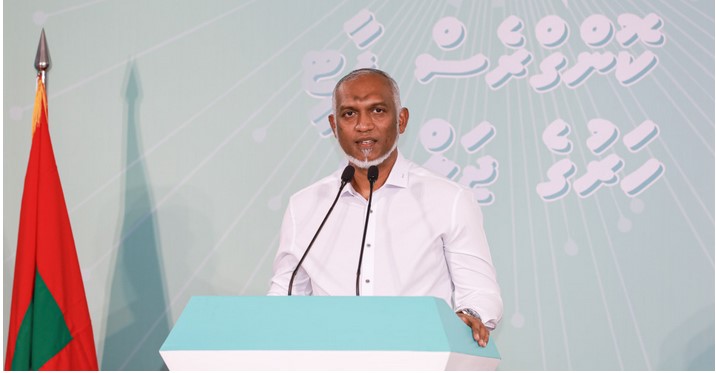Colombo, October 29 (newsin.asia): In a significant step towards strengthening democracy and ensuring good governance, the Maldivian President Dr. Mohamed Muizzu on Tuesday committed his administration to a policy of non-interference with independent commissions and authorities.
This announcement, met with widespread support, aims to enhance the transparency and independence of key institutions crucial to maintaining checks and balances within the Maldivian government.
The President’s remarks come in response to criticism from the opposition Maldivian Democratic Party (MDP) regarding a proposed bill that would grant him the authority to appoint the heads of the Anti-Corruption Commission (ACC) and the Elections Commission from among their appointed members.
The MDP said that under the proposed framework, while the commissions will be appointed by parliament, the President will have the final say in selecting their leadership.
President Muizzu’s statement aims to clarify the government’s position amid ongoing discussions about the balance of power and accountability within the nation’s institutions.
The President said in X: “I have never done anything to influence the powers of any State or any independent institution or any elected person! Instead, the government will continue to propose amendments to the laws and regulations to ensure that such bodies work fairly and equitably regardless of anyone, and take all necessary steps to shape things in that direction.”
In his recent address, President Dr. Muizzu emphasized that the role of independent commissions, such as the Anti-Corruption Commission (ACC), the Human Rights Commission, and the Elections Commission, is paramount to a healthy democracy.
Underlining the importance of these bodies in holding the government accountable, he pledged that his administration will not interfere with their operations, investigations, or decision-making processes.
“These institutions were created to serve the people, and they must operate free from political influence,” President Muizzu stated. “Our commitment to non-interference is a promise to the people of the Maldives that we respect the independence of these bodies as a cornerstone of democratic governance.”
New Standard of Governance
President Muizzu’s pledge reflects a broader reform agenda aimed at reinforcing the Maldives’ democratic principles. With a focus on accountability and respect for the rule of law, his administration intends to set a new standard for governance by avoiding undue influence over independent bodies.
This move is expected to empower these institutions, giving them the freedom to carry out their mandates without external pressure.
By allowing independent commissions to conduct investigations and provide oversight freely, President Muizzu hopes to build trust with the public and reassure citizens that their voices will be heard without bias or favouritism.
Public Trust and Transparency
The President’s announcement has resonated strongly with civil society organizations, legal experts, and citizens, who have long advocated for the autonomy of independent institutions.
By stepping back and allowing these commissions to perform their duties objectively, the Muizzu administration aims to restore public confidence in government operations, particularly regarding issues of accountability, human rights, and fair elections.
A notable example is the Anti-Corruption Commission, which will continue its efforts to address corruption without political influence, an essential component of Dr. Muizzu’s vision for a transparent and accountable Maldives.
Commitment to Global Standards
President Muizzu’s stance has drawn praise from international observers and organizations that support democratic governance. In line with global standards, the President has also encouraged the commissions to cooperate with international agencies, where appropriate, to strengthen their operational frameworks and bring Maldives into closer alignment with best practices worldwide.
Challenges
While Dr. Muizzu’s commitment is seen as a positive development, maintaining non-interference across all levels of government and throughout his administration’s term will be a challenging endeavour.
However, analysts and political observers believe that this commitment, if sustained, could redefine governance in the Maldives and strengthen the nation’s democratic institutions.
As President Muizzu’s policy unfolds, his administration’s success in upholding the independence of these commissions will be carefully monitored, both domestically and internationally.
The President’s pledge marks a potential turning point for governance in the Maldives, and if realized, could become a model for other nations striving for democratic integrity.
END































































